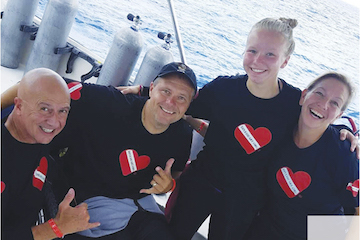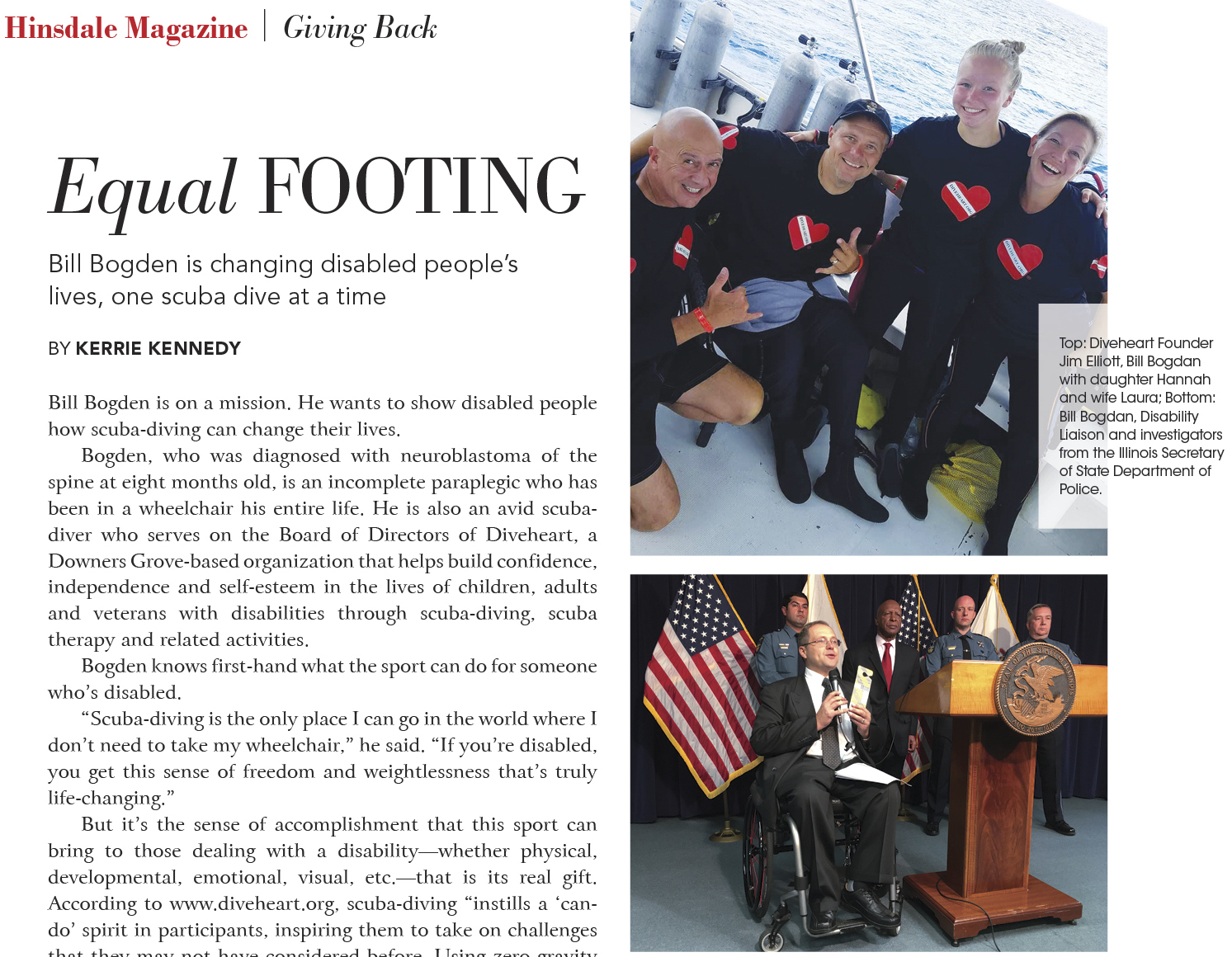
Diveheart
Equal FOOTING
Bill Bogden is changing disabled people’s lives, one scuba dive at a time
by Kerrie Kennedy
Hinsdale Magazine
Bill Bogden is on a mission. He wants to show disabled people how scuba-diving can change their lives.
Bogden, who was diagnosed with neuroblastoma of the spine at eight months old, is an incomplete paraplegic who has been in a wheelchair his entire life. He is also an avid scuba- diver who serves on the Board of Directors of Diveheart, a Downers Grove-based organization that helps build confidence, independence and self-esteem in the lives of children, adults and veterans with disabilities through scuba-diving, scuba therapy and related activities.
Bogden knows first-hand what the sport can do for someone who’s disabled.
“Scuba-diving is the only place I can go in the world where I don’t need to take my wheelchair,” he said. “If you’re disabled, you get this sense of freedom and weightlessness that’s truly life-changing.”
But it’s the sense of accomplishment that this sport can bring to those dealing with a disability—whether physical, developmental, emotional, visual, etc.—that is its real gift. According to www.diveheart.org, scuba-diving “instills a ‘can- do’ spirit in participants, inspiring them to take on challenges that they may not have considered before. Using zero gravity and the adventure paradigm, we help participants believe that if they can scuba dive, they can do anything.”
Bogden, who serves as the disability liaison for Illinois Secretary of State Jesse White and chairs the Illinois Council on Developmental Disabilities, met with U.S. Senator Tammy Duckworth, D-Illinois, last year, and convinced her to get in the water and try scuba-diving.
“She dove before she was injured, but she didn’t even know it was a possibility for her,” Bogden said.
An Iraq War veteran, Duckworth served as a U.S. Army helicopter pilot, and lost both of her legs and some mobility in her right arm after suffering severe combat wounds. She was the first female double amputee from the war.
It took a while, but Bogden finally convinced Duckworth to try it out.
“I brought her to a pool in Orland Park, and she was amazed,” he said.
Still, he didn’t fully understand the impact it had on her until last April, when he was in Washington, D.C. for the Disability Policy Summit, and decided to stop by Duckworth’s office to say hello. There on her wall was a portrait of the senator posing with members from Diveheart, memorializing a proud moment for all visitors to see.
“As a person with a disability, being able to share that experience with others is truly inspiring,” Bogden said. “I dive with military veterans who have lost limbs, and often work with people whose disabilities are more severe than mine, sometimes complete quadriplegics with paralysis of both arms and legs. Being able to accomplish this makes them realize they can apply it to other things in their lives. Life doesn’t have to stop just because you have a disability.”
Through Diveheart, Bogden also works with able-bodied individuals who want to learn how to teach someone with a disability to scuba-dive.
“Through our dive instructor program, they learn the skills people with disabilities need to become ‘adaptive divers,’” he said, noting that he swims with web gloves since he doesn’t have the use of his feet.
Bogden also helps plan three trips a year to Cozumel with Diveheart, where the currents there help make it easier for people with disabilities to move around. On a recent trip, Bogden got the chance to scuba-dive with his 15-year-old daughter, who is able-bodied.
“As a person with a disability and a father, it was incredible to be able to share that experience with her,” he said. “We try to make these trips as inclusive as possible, so family and friends can experience this together.”
Underwater, Bogden said, is a place where everyone is equal.
Read full online article (article is on page 46)
Download article (PDF)

